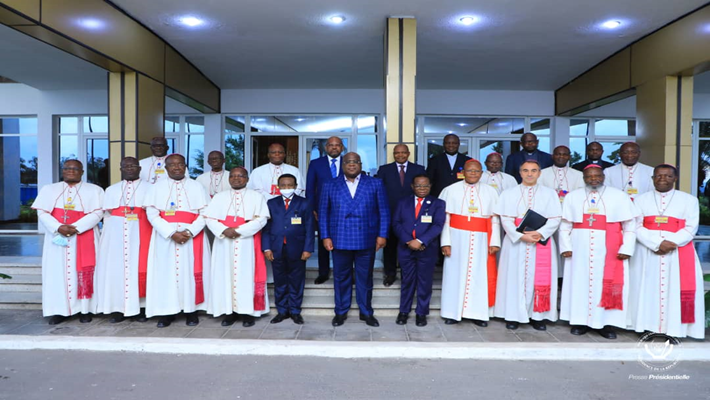By CISA
KINSHASA, NOVEMBER 5, 2024 (CISA) – Catholic bishops in the Democratic Republic of Congo (DRC) have issued an elaborate memorandum to President Félix Tshisekedi, urging swift action on critical concerns ranging from stalled social initiatives to deteriorating security in the eastern regions, which continue to impact millions across the country.
The memorandum dated November 1, 2024, and presented by the National Episcopal Conference of Congo (CENCO), highlights pressing socio-economic, security, and governance challenges facing the nation, including escalating poverty, deep-rooted corruption, and severe instability in eastern regions.
Socio-Economic Challenges
The bishops commended some of President Tshisekedi’s social initiatives, such as the free basic education program, maternity healthcare efforts, and the 145-territory development initiative, which have had a positive impact across the DRC. However, CENCO voiced concerns over what it perceives as a lack of oversight.
“These good initiatives suffer from a lack of monitoring and control,” the memorandum reads. “Projects that benefit the population are suffering either due to poor management or irregular funding,” they added, urging the president to “identify truly suitable and honest people” to oversee the implementation of these programs.
Despite the government’s efforts, the bishops underscored that the socio-economic conditions of most Congolese remain dire. According to the World Bank, the DRC’s poverty index rose sharply from 13.6 in 2019 to 25.7 in 2023, a troubling trend that has been exacerbated by rising inflation, which went from 9.2% in 2022 to a staggering 20.7% in 2023. CENCO noted that while civil servants’ salaries are now paid more regularly, they remain insufficient to keep up with the rising cost of living.
“This leads to a very significant loss of purchasing power for the Congolese people,” the memorandum stated.
The bishops also took aim at the growing public debt, which has reportedly reached nearly $10 billion. They recommended a more ethical approach to governance, urging a reduction in the standard of living for public institutions.
“The opposite would go against the motto dear to your father: ‘the people first,’” they reminded President Tshisekedi.
Security Concerns in Eastern DRC
The memorandum highlighted the ongoing security crisis in eastern DRC, where both local and foreign armed groups continue to operate with impunity, resulting in severe instability and human suffering. Bunagana, a key town in the region, has been under rebel control for two years. CENCO expressed deep concern over the high toll these conflicts have taken on civilians, resulting in millions of displaced people living in “subhuman conditions.”
To address these challenges, the bishops recommended bolstering resources for the Armed Forces of the Democratic Republic of Congo (FARDC) and taking decisive action against traitorous officers.
They further called for national unity, asserting that “Your diplomacy will emerge stronger if it is driven by a national dynamic that includes the collaboration of all vital forces of the country, including the political opposition.”
However, they lamented that this appeal for unity has gone unheeded due to “certain political considerations that do not serve the unity of the country.”
“We want to insist here on the need to strengthen national cohesion to face the common enemy,” the bishops emphasized.
Political Stability and Electoral Integrity
Reflecting on last year’s elections, the bishops highlighted frustrations over irregularities, which they warned could erode national cohesion.
“The irregularities and incidents that characterized the last elections created great frustration, even within the Majority,” the memorandum noted. To restore public confidence, they recommended convening consultations among the country’s main stakeholders to discuss the organization of future elections.
CENCO also cautioned against potential changes to the Constitution, warning that any move to amend protected articles could destabilize the nation.
“We are already urging you to ensure that the locked articles that we protected together when you were in opposition are not touched.,” they wrote, cautioning that ignoring this request could lead to “social tensions that are difficult to manage” at a time when national unity is paramount.
Judicial and Governance Concerns
CENCO expressed deep disappointment with the state of the justice system, condemning the “corruption, embezzlement of public funds, and impunity” that have become pervasive.
The bishops cited political interference in judicial proceedings as a major factor eroding citizens’ faith in the legal system, especially in light of recent mishandlings at the country’s highest court.
“The disaster observed at the highest jurisdictional court in the handling of electoral disputes is eloquent testimony to this,” the bishops noted.
The bishops called on President Tshisekedi to make significant reforms in his second term, stating that “more than strong signals” are needed to create a new perception of justice in the DRC. They encouraged him to correct past injustices and ensure the rights of all Congolese are upheld.
